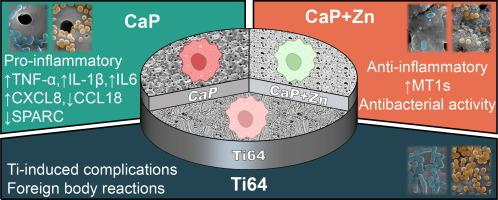掺杂锌的CaP涂层使钛植入物具有耐腐蚀、生物矿化、抗菌和免疫耐受活性
IF 13
1区 综合性期刊
Q1 MULTIDISCIPLINARY SCIENCES
引用次数: 0
摘要
慢性炎症导致种植体失败是骨科、牙科和重建外科的主要挑战。钛合金虽然被广泛使用,但经常引起炎症并发症。锌掺杂磷酸钙(CaP)涂层通过提高抗腐蚀性、生物活性和免疫相容性,提供了增强植入物整合的潜力。本研究的目的是在Ti64合金种植体上开发一种基于锌掺杂CaP涂层的新型涂层组合物,该组合物首次提高了Ti64合金种植体的耐腐蚀性和抗菌性能,并主要通过适当的组织巨噬细胞编程来提高先天免疫的相容性,从而促进种植体的长期接受。方法采用微弧氧化(MAO)技术分别在sti64衬底上包覆CaP和掺杂zn的CaP。采用渐进划痕试验研究了基材与涂层之间的附着力。通过电化学试验和模拟体液浸泡对其耐腐蚀性和生物活性进行了评价。RNA测序用于评估人原代巨噬细胞的炎症反应。对大肠杆菌和金黄色葡萄球菌进行了抑菌试验。结果zn的加入显著提高了涂层对Ti64合金的附着力,临界载荷从4 N增加到11 N,增加了一倍。锌掺杂CaP涂层表现出增强的耐腐蚀性和增加的生物矿化。RNA测序结果显示,添加锌可抑制炎症并促进耐受性巨噬细胞编程。最显著的作用是对愈合巨噬细胞中cap抑制的氧化磷酸化和溶酶体途径的代偿作用,以及金属硫蛋白的上调。锌掺杂涂层也表现出优异的抗菌效果,分别减少大肠杆菌和金黄色葡萄球菌的定植99% %和90% %。结论Ti64种植体表面掺杂锌的CaP涂层明显提高了Ti64种植体的耐腐蚀性、生物活性和抗菌性能。我们开发了先进的多功能生物材料,配备了有益的抗炎和先天免疫组织整合程序,为长期种植体整合和降低种植体失败风险提供了主要优势。本文章由计算机程序翻译,如有差异,请以英文原文为准。

Zn-doped CaP coating equips Ti implants with corrosion resistance, biomineralization, antibacterial and immunotolerant activities
Introduction
Chronic inflammation leading to implant failure present major challenges in orthopedics, dentistry, and reconstructive surgery. Titanium alloys, while widely used, often provoke inflammatory complications. Zinc-doped calcium phosphate (CaP) coatings offer potential to enhance implant integration by improving corrosion resistance, bioactivity, and immunocompatibility.Objectives
The objective of the study was to develope novel coating composition based on zinc-doped CaP coatings on Ti64 alloy implants that for the first time combines improved corrosion resistance, antibacterial properties and principally improved compatibly with the innate immunity primarily due to the proper programming of resident tissue macrophages to promote long-term implant acceptance.Methods
Ti64 substrates were coated with CaP and Zn-doped CaP using the microarc oxidation (MAO) technique. The adhesion between substrate and coatings are investigated by the progressive scratch test. The corrosion resistance and bioactivity were evaluated through electrochemical tests and simulated body fluid immersion. RNA sequencing was used to assess inflammatory responses in human primary macrophages. Antibacterial efficacy was tested against Escherichia coli and Staphylococcus aureus.Results
Zn addition significantly increased the adhesion of the coatings to Ti64 alloy, doubling up the critical load (from 4 N to 11 N). Zn-doped CaP coatings demonstrated enhanced corrosion resistance and increased biomineralization. RNA sequencing revealed that Zn addition suppressed inflammatory and promoted tolerogenic macrophage programming. Most pronounced effects was compensatory effect Zi on the CaP-supressed oxidative phosphorylation and lysosomal pathways in healing macrophages, and by upregulation of metallothioneins. Zn-doped coatings also exhibited superior antibacterial efficacy, reducing E. coli and S. aureus colonization by 99 % and 90 %, respectively.Conclusion
Zinc-doped CaP coatings on Ti64 implants significantly improved corrosion resistance, bioactivity, and antibacterial performance. We developed advanced multifunctional biomaterial equipped with beneficial anti-inflammatory and tissue integrative programming of innate immunity providing principal advantages for the long-term implant integration and reducing the implant failure risks.求助全文
通过发布文献求助,成功后即可免费获取论文全文。
去求助
来源期刊

Journal of Advanced Research
Multidisciplinary-Multidisciplinary
CiteScore
21.60
自引率
0.90%
发文量
280
审稿时长
12 weeks
期刊介绍:
Journal of Advanced Research (J. Adv. Res.) is an applied/natural sciences, peer-reviewed journal that focuses on interdisciplinary research. The journal aims to contribute to applied research and knowledge worldwide through the publication of original and high-quality research articles in the fields of Medicine, Pharmaceutical Sciences, Dentistry, Physical Therapy, Veterinary Medicine, and Basic and Biological Sciences.
The following abstracting and indexing services cover the Journal of Advanced Research: PubMed/Medline, Essential Science Indicators, Web of Science, Scopus, PubMed Central, PubMed, Science Citation Index Expanded, Directory of Open Access Journals (DOAJ), and INSPEC.
 求助内容:
求助内容: 应助结果提醒方式:
应助结果提醒方式:


